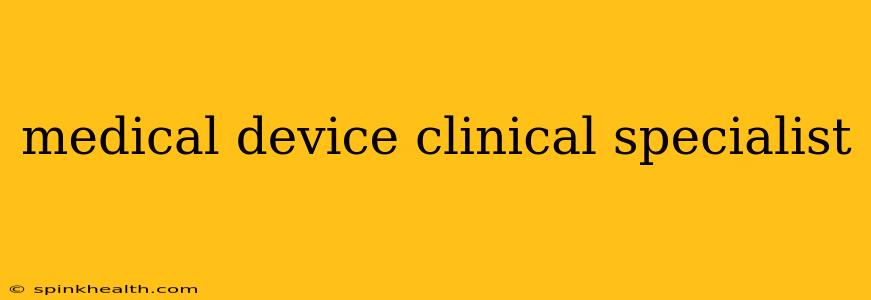The whirring of sophisticated machinery, the hushed tones of a hospital room, the quiet satisfaction of knowing you've made a difference – this is the world of a medical device clinical specialist. It's a career path that blends technical expertise with a deep understanding of human needs, a demanding yet incredibly rewarding role. But what exactly does a medical device clinical specialist do? Let's delve into a typical day, exploring the challenges and triumphs of this crucial profession.
My name is Sarah, and I've been a medical device clinical specialist for five years. My journey started with a fascination for medical technology and a desire to help people directly. I'm passionate about bridging the gap between cutting-edge innovation and practical application, ensuring patients benefit from the latest advancements.
A Typical Day: A Balancing Act of Technology and Compassion
No two days are ever truly alike, but a typical day might begin with a hospital visit. I'm responsible for supporting our company's cardiac rhythm management devices – pacemakers and implantable cardioverter-defibrillators (ICDs). This means I'm often found in electrophysiology labs or cardiac catheterization units, working alongside cardiologists and nurses.
My morning might involve programming a new pacemaker for a patient, carefully adjusting settings to optimize its function based on their individual needs. This isn't just about technical proficiency; it's about building rapport with patients and their families, explaining the device's function in a clear and reassuring manner.
After the morning hospital rounds, I might head back to the office to catch up on administrative tasks. This includes documenting procedures, preparing training materials for healthcare professionals, and reviewing the latest research and clinical studies to stay abreast of new developments in the field. Staying updated is critical—technology in medical devices is constantly evolving.
What are the Key Responsibilities of a Medical Device Clinical Specialist?
This question frequently arises, and it’s multifaceted:
Training and Education: A significant portion of my role is providing training and education to healthcare professionals on the proper use and maintenance of our devices. This includes workshops, in-service training sessions, and one-on-one mentoring. Effective training is paramount to ensuring patient safety and optimal device performance.
Technical Support and Troubleshooting: Occasionally, I'm called upon to troubleshoot device malfunctions or address technical issues that arise. Quick thinking and problem-solving skills are crucial in these situations. My goal is to minimize downtime and ensure patients continue receiving the necessary therapy.
Clinical Support and Patient Interaction: While not directly involved in patient care, my role is intimately connected to patient outcomes. I'm responsible for assisting healthcare professionals in utilizing the device effectively and responding to clinical questions, ensuring patients receive appropriate support.
What skills are essential for a Medical Device Clinical Specialist?
Another frequently asked question revolves around the necessary skillset. It requires a unique blend of competencies:
-
Clinical Knowledge: A strong foundation in relevant medical terminology, anatomy, physiology, and clinical practices is essential.
-
Technical Proficiency: A deep understanding of the devices themselves, including their functionality, programming, and maintenance is critical.
-
Communication and Interpersonal Skills: Working effectively with a diverse team of healthcare professionals and building trust with patients requires excellent communication and interpersonal skills.
-
Problem-Solving and Critical Thinking: The ability to analyze situations, identify problems, and develop effective solutions is crucial in this fast-paced environment.
-
Adaptability and Continuous Learning: The medical technology field is constantly evolving, requiring specialists to adapt to new technologies and continually expand their knowledge.
What is the career path for a Medical Device Clinical Specialist?
This often depends on individual career goals and the specific company. Some specialists focus on developing their expertise within a specific area, while others may pursue leadership roles, such as clinical education managers or senior clinical specialists.
What is the salary range for a Medical Device Clinical Specialist?
Salary varies depending on experience, location, and employer. Extensive experience, combined with specialized expertise, can substantially increase earnings.
In conclusion, being a medical device clinical specialist is far more than a job; it's a calling. It's about using technology to improve lives, bridging the gap between innovation and patient care. It's a challenging but incredibly fulfilling career for those who are passionate about medicine, technology, and helping others.

